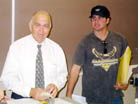Edward Thurber / Staff Writer
As a first time student at Fresno State, and with the encouragement of the Armenian Studies Program, I found myself taking Armenian Studies 105, Armenian Genocide in Comparative Context, taught by Dr. Richard Hovannisian.
 Dr. Hovannisian, Professor of Armenian and Near East History and Holder of the Armenian Educational Foundation Chair in Modern Armenian History at the University of California, Los Angeles, is this semester’s Henry S. Khazandian Kazan Visiting Professor of Armenian Studies at Fresno State. Past comes to life in class lectures. Whether defining the term “genocide” or pondering the history of the society leading up to the event, Dr. Hovannisian’s knowledge of the field makes him a stimulating facilitator of discussion.
Dr. Hovannisian, Professor of Armenian and Near East History and Holder of the Armenian Educational Foundation Chair in Modern Armenian History at the University of California, Los Angeles, is this semester’s Henry S. Khazandian Kazan Visiting Professor of Armenian Studies at Fresno State. Past comes to life in class lectures. Whether defining the term “genocide” or pondering the history of the society leading up to the event, Dr. Hovannisian’s knowledge of the field makes him a stimulating facilitator of discussion.
When I was a child, there were those special occasions when my grandmother would come and pay my family a visit. I remember waking up in the mornings and running to my grandmother’s room and jumping on her bed, waiting to hear the stories of her life. She told stories of the old country and her experience surviving the Genocide of 1915. These stories took fairy-tale form in my imagination, full of childlike impressions of a far away land and a mythic struggle of good against evil.
Dr. Hovannisian’s retelling of the same events gives me the chance to approach the matter as an adult. Dr. Hovannisian said it is important “for descendants of survivors to know their past so that they may know themselves.” Together the class discusses issues such as Armenian vulnerability at the time, the mindset of the perpetrators, and various typologies of Genocide.
 ” Informed discussion can be very helpful and stimulating and this is possible only when the class collectively is prepared to engage in this,” Hovannisian said. ” I have been impressed with the seriousness of the students and their openness to the new concepts that have been introduced.”
” Informed discussion can be very helpful and stimulating and this is possible only when the class collectively is prepared to engage in this,” Hovannisian said. ” I have been impressed with the seriousness of the students and their openness to the new concepts that have been introduced.”
The purpose of delving into the Armenian Genocide is not only to satisfy one’s curiosity or for self-discovery but to understand genocides in modern history as well.
Dr. Hovannisian said, “The Armenian Genocide was in many ways the prototype of modern genocides, and by studying that case it is possible to engage in the comparative study of genocide, noting the similarities and differences of the individual calamities, learning what the early warning signals for genocide might be, understanding what the international community can do and what are the consequences of its playing the role of uninvolved bystander.”
As a student, studying warning signals and efforts the international community can make in the area of prevention has been particularly appealing. We have been assigned reading in the course, such as Franz Werfel’s The Forty Days of Musa Dagh and Remembrance and Denial: The Case of the Armenian Genocide, edited by Dr. Hovannisian, and various other short selections which serve to define the term genocide and give background to the Armenians’ and world’s experience with it.
The reading is gripping from several angles: that of scholarly and human interest, its content of dramatic events, and one’s personal connection with the subject. The chance to study the Armenian Genocide in a university setting is a rare opportunity. We are fortunate to have a pioneering scholar to lead it. Not one university in the U.S. had courses in Armenian history when Dr. Hovannisian was a student in the 1950’s.
After completing a B.A. and General Secondary Teaching Degree at University of California, Berkeley, Dr. Hovannisian went to Beirut to gain exposure to the field of Armenian history and the Armenian language. Though he has taught classes that have included the topic of the Armenian Genocide, Hovannisian says, “I have never had the luxury of teaching a full semester on the subject.”
Thus, teaching the Genocide course at Fresno State is an experiment, which may have ramifications that go beyond the campus and the San Joaquin Valley community, and I’m glad we are all a part of the experiment. Dr. Hovannisian’s various contributions to the study of the Genocide include The Armenian Genocide in Perspective, The Armenian Genocide: History, Politic, Ethics, and Remembrance and Denial: The Case of the Armenian Genocide.
 Hye Sharzhoom Armenian Action
Hye Sharzhoom Armenian Action